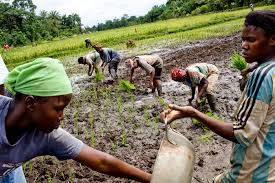The increase in agricultural production in eastern Cote d’Ivoire, via programs supported by the African Development Bank (AfDB), has revived economic activities in this part of the country, according to a report from the financial institution.
Agricultural production has “increased tenfold” these past few years, revitalizing the local economy, following the implementation of the Agricultural Infrastructure Support Project in the Indenie-Djuablin Region (PAIA-ID), between 2012 and 2019, the September 18, 2020 AfDB report indicates.
Funded to the tune of US$ 30.2 million (16.89 billion CFA francs) by the AfDB, this project made it possible in particular to “restore the conditions of production and sale of agricultural products in this region which has great potential”.
The original objective of PAIA-ID, the text reports, was to increase, in a sustainable manner, the production and productivity of the main crops in the region through the development of infrastructure and the strengthening of organizational and institutional capacities.
“PAIA-ID has helped us a lot,” said Mamadou Kone, president of the approved management cooperative (CGA) of the lowland “CAFOP”. In the past, producers had a yield of 10 bags of rice per hectare, but today they are at around 40 bags of rice.
These results were achieved through the use of irrigation schemes carried out as part of the project, and which significantly improved the yields of food crops for farmers.
In 2019, yields for plantain rose by 162 percent, cassava (223 percent), rainfed rice (more than double) and irrigated rice (91 percent), the report says, noting also that at the same time, agricultural infrastructure has developed.
There are 752.1 hectares of developed lowlands, 40 boreholes installed, 100 human-powered pumps renovated, six rural markets built, as well as 17 rice storage units.
The project has facilitated the opening up of production areas. In addition, over 566 kilometers of rural tracks have been renovated. With this rehabilitation, producers were able to have easy access to their plantations.
Sylvain Ano Kouao, president of the CGA “Niamien-Dissou”, has also benefited from the spin-offs of PAIA-ID, which has enabled an increase in cultivable land and improved productivity, which has strengthened food security.
“The developments made have allowed us to exploit large areas,” says Ano Kouao, citing the 33 hectares developed with a water reservoir and a dam, and the delivery of a store and a warehouse. We now have enough rice to feed our family. “
The development of irrigated agriculture has revitalized the local economy. With the exception of yam, production of the target crops exceeded 300,000 tonnes at the end of the project.
With plantains and cassava, local production could reach 310,000 tonnes by the end of 2020. The project has empowered women who account for a quarter of beneficiaries.
PAIA-ID has also invested in capacity building and support for women and young people in the region, which is the culmination of the project for the sustainability of activities.
The project installed 200 cocoa fermentation tanks, distributed 20 quality control kits, supported 20 coffee-cocoa cooperatives to ensure compliance with legal provisions relating to cooperative societies, and supported the organization of 71 supply chain groups. Over 2,100 producers have been trained in farming practices through the project, the report concludes.
AP/ls/fss/abj/APA


